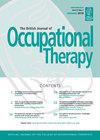Assessing the quality of life priorities in the elderly: Application of the Turkish-Adapted Mayers’ Lifestyle Questionnaire (3)
IF 1.3
4区 医学
Q3 REHABILITATION
引用次数: 0
Abstract
Introduction:The growing aging population requires the development of new policies and programs to meet the needs and expectations of the elderly. Identifying priorities for the elderly’s quality of life can be the foundation for rehabilitation services provided to the elderly. This study aims to assess the quality of life priorities in the elderly using the Turkish-adapted Mayers’ Lifestyle Questionnaire (3).Method:The study included 171 elderly with a mean age of 74.72 ± 4.36 years. Participants completed a sociodemographic information form and the Turkish-Adapted Mayers’ Lifestyle Questionnaire (3).Results:Quality of life priorities for elderly people were independence in reading and writing, participation in paid and/or voluntary work, spiritual, and satisfying activities, and the ability to make choices about their lives.Conclusion:The study results showed that Mayers’ Lifestyle Questionnaire (3) supports setting priorities by examining the quality of life of elderly people from a multidimensional perspective. The use of Mayers’ Lifestyle Questionnaire (3) can contribute to the development of effective strategies aimed at improving the quality of life for elderly individuals. A holistic approach to each factor affecting quality of life will enable occupational therapists and other professionals involved with elderly people to consider person-centered factors in their interventions.评估老年人生活质量的优先事项:土耳其改编的梅耶斯生活方式问卷的应用 (3)
导言:随着老龄人口的不断增长,需要制定新的政策和计划来满足老年人的需求和期望。确定老年人生活质量的优先事项可以为向老年人提供康复服务奠定基础。本研究旨在使用经土耳其改编的《梅耶斯生活方式问卷》(3)评估老年人的生活质量优先事项。结果:老年人生活质量的优先事项是阅读和写作的独立性、参与有偿和/或志愿工作、精神和令人满意的活动,以及对自己的生活做出选择的能力。使用梅耶斯生活方式问卷(3)有助于制定旨在提高老年人生活质量的有效策略。对影响生活质量的每个因素采取综合方法,可使职业治疗师和其他与老年人打交道的专业人员在采取干预措施时考虑到以人为本的因素。
本文章由计算机程序翻译,如有差异,请以英文原文为准。
求助全文
约1分钟内获得全文
求助全文
来源期刊

British Journal of Occupational Therapy
REHABILITATION-
CiteScore
2.20
自引率
15.40%
发文量
81
审稿时长
6-12 weeks
期刊介绍:
British Journal of Occupational Therapy (BJOT) is the official journal of the Royal College of Occupational Therapists. Its purpose is to publish articles with international relevance that advance knowledge in research, practice, education, and management in occupational therapy. It is a monthly peer reviewed publication that disseminates evidence on the effectiveness, benefit, and value of occupational therapy so that occupational therapists, service users, and key stakeholders can make informed decisions. BJOT publishes research articles, reviews, practice analyses, opinion pieces, editorials, letters to the editor and book reviews. It also regularly publishes special issues on topics relevant to occupational therapy.
 求助内容:
求助内容: 应助结果提醒方式:
应助结果提醒方式:


